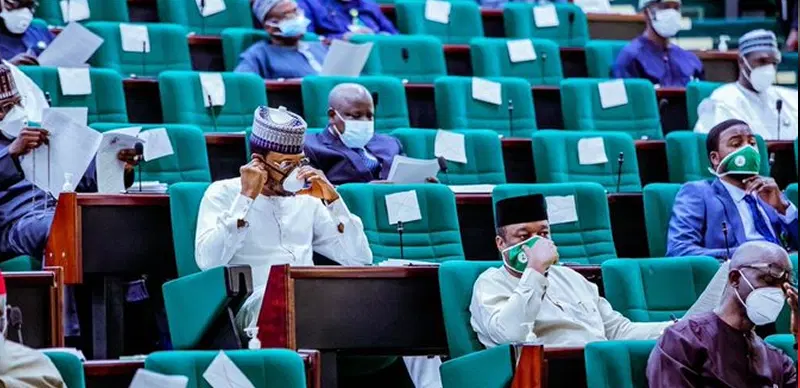Lawmakers have raised concerns over the Tinubu administration’s $2.2 billion loan request, questioning the need for foreign borrowing despite exceeding revenue targets in 2024.
Members of the joint National Assembly Committees on Finance, led by Senators Sani Musa and Abiodun Faleke, expressed their objections during the scrutiny of the 2025-2027 Medium Term Expenditure and Fiscal Strategy Paper (MTEF-FSP) on Monday.
They questioned the federal government’s request for a $2.2 billion loan this year, especially after claiming to have generated over $20 billion from the removal of the oil subsidy.
Lawmakers expressed concern over the need for additional borrowing given the significant revenue boost.
Senator Adamu Aliero (PDP Kebbi Central), asked “What is the federal government doing with excess revenues generated by the various agencies in view of its unending request for foreign loan approval?”
In response, the Chairman of the Federal Inland Revenue Service, Zacchaeus Adedeji, clarified that the loans requested by the executive were already included in the 2024 budget.
He further explained that the National Assembly had previously approved these loans when they considered and passed the 2024 Appropriation Bill.
“The fact that we meet revenue targets, does not mean we should not go and borrow and the reason is simple. The budget we have has both borrowing component and internally generated revenue component.
“So it is total package, our borrowing target is there in the budget as approved by the National Assembly,” he said.
Similarly, Senator Atiku Bagudu, the Minister of Budget and Economic Planning, argued that lawmakers should not overlook the fact that the borrowing plans outlined in the N35.5 trillion 2024 budget were primarily intended to cover the budget deficit, which amounts to N9.7 trillion.
Bagudu emphasized that despite some revenue-generating agencies surpassing their targets, the government still needed to borrow to adequately fund the budget, particularly to address the deficit and support productivity initiatives for the poorest and most vulnerable populations.
He said, “We have a long term development perspective plan agenda 2050 aiming at GDP per capital of $33,000.”
The Minister of Finance and Coordinating Minister of the Economy, Mr. Wale Edun, also explained to the lawmakers that borrowing was still needed for proper funding of the budget despite increased revenues made by some agencies.
During their separate presentations before the joint committees on the 2024 budget performance and the revenue projections for the N49.7 trillion 2025 budget, the revenue-generating agencies reported surpassing their revenue targets for the 2024 fiscal year.
The first submission came from the Comptroller-General of the Nigeria Customs Service, Bashir Adeniyi, who revealed that by September 30, 2024, Customs had generated N5.352 trillion in revenue, exceeding the N5.09 trillion target set for the entire fiscal year.
He further stated that the projected revenue target for the Nigeria Customs Service in 2025 is N6.3 trillion, marking a 10% increase from the previous year, adding that the revenue target for 2026 would also reflect a 10% increase, with a similar rise projected for the 2027 fiscal year.
The Group Chief Executive Officer (GCEO) of Nigerian National Petroleum Company (NNPCL), Mr Mele Kyari, in his presentation, said the company exceeded the N12.3 trillion revenue projected for 2024 by already raking in N13.1 trillion.
“For the 2025 fiscal year, N23.7 trillion is projected by NNPCL to be remitted into the federation account,” he said.
The Chairman of FIRS, Zacchaeus Adedeji, informed the joint committees that the Federal Inland Revenue Service had exceeded its revenue targets across various tax components.
He noted that for the Company Income Tax, the target was N4 trillion, but FIRS had already collected N5.7 trillion.
“On Education tax, while N70 billion was targeted, a total of N1.5 trillion has been realised.
“All in all, out of N19.4 trillion targeted for 2024 fiscal year, N18.5trillion was realised as at the end of September, which clearly shows that the target will be far exceeded by the end of the year,” he said.
However, the Nigeria Immigration Service faced criticism during the interactive session over its Private Public Partnership arrangement for passport production.
The arrangement, which allocated 70% of the proceeds to a consultancy firm and only 30% to the government, raised concerns among lawmakers about its fairness and potential impact on government revenue.
The Chairman of the Senate Committee, Senator Sani Musa, ordered Immigration to present all the documents on the unacceptable PPP arrangement to the committee before the end of the week.
“The so-called PPP arrangement must be reviewed or cancelled because Nigeria and Nigerians are seriously being short changed,” he said.










